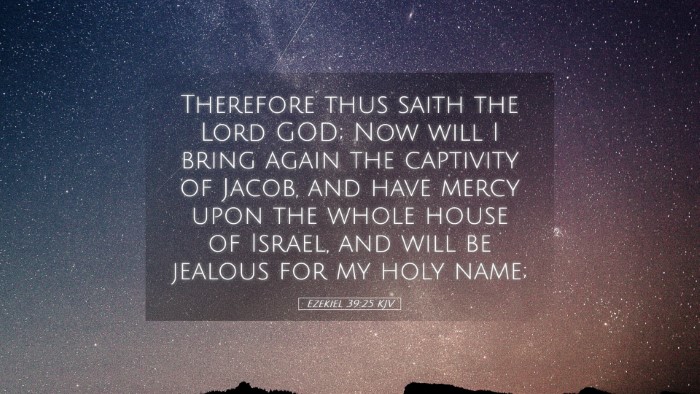Ezekiel 39:25 - Commentary
Ezekiel 39:25 (ESV): "Therefore thus says the Lord GOD: Now I will restore the fortunes of Jacob and have mercy on the whole house of Israel, and I will be jealous for my holy name."
Contextual Background
The prophecy of Ezekiel encompasses significant themes of judgment and restoration. As God’s chosen prophet, Ezekiel speaks during the Babylonian exile, a period marked by despair and a deep sense of loss among the Israelites. In this context, Ezekiel 39 serves to glorify God's ultimate plan for His people, illustrating both His wrath against their sins and His unwavering commitment to restoration.
Insights from Public Domain Commentaries
1. Matthew Henry's Commentary
Matthew Henry highlights the profound mercy and grace of God in this passage. He asserts that the restoration of Jacob signifies the re-establishment of God's covenant relationship with His people. Henry writes that "God’s mercies are new every morning," emphasizing that despite Israel’s unfaithfulness, God remains steadfast in His commitments. The phrase "I will restore the fortunes of Jacob" indicates a complete reversal of their misfortunes, showcasing God's power to redeem and renew.
2. Albert Barnes' Notes on the Bible
Albert Barnes elaborates on the implications of divine restoration. He interprets the phrase "have mercy on the whole house of Israel" as a comprehensive promise that encompasses not only the physical restoration of Israel but also spiritual renewal. Barnes points out that this promise is linked to God’s "jealousy for His holy name," which underscores the sacredness of God's character and the seriousness with which He regards the honor due to His name. Through restoration, God presents Himself as both righteous and compassionate.
3. Adam Clarke's Commentary
In Adam Clarke's analysis, he emphasizes the significance of "restoring the fortunes" as not merely a return to the status quo but an elevation to a greater spiritual and communal unity. Clarke also reflects on the theological implications of God’s jealousy: "He is concerned for His honor, and His people must reflect His holiness." Clarke interprets this jealousy as a divine safeguard for Israel’s future, reminding believers of the sanctity required in their relationship with God.
Theological Themes
- Restoration and Renewal: This verse encapsulates the broader theme of restoration which is pivotal throughout prophetic literature. God’s promise to restore indicates His willingness to renew and reclaim His people.
- Divine Jealousy: God's jealousy is portrayed as an active pursuit to bring glory to His name. His character demands holiness from His people while reflecting His unchanging nature and attributes.
- Covenant Faithfulness: The covenant made with Jacob becomes a focal point for understanding God's redemptive plans. Each promise reflects His unwavering commitment to His purposes despite humanity’s failures.
Application for Pastors, Students, and Theologians
In light of Ezekiel 39:25, pastoral leaders are encouraged to emphasize God's merciful character and His desire for restoration in their congregations. Through preaching and teaching, they can instill hope where hopelessness abounds, reinforcing the reality that no one is beyond the reach of God’s grace.
Students of theology are invited to delve into the interplay between divine judgment and restoration. This passage can be a crucial point for discussions on the attributes of God, particularly focusing on His justice, mercy, and holiness.
For scholars, this verse offers a rich vein of exploration regarding Israel's identity and purpose in the biblical narrative. The implications of divine jealousy raise significant questions about human commitment and fidelity to God’s call. This verse stands as a testament to God's overarching narrative — one that invites deep reflection on the nature of restoration and community.
Conclusion
Ezekiel 39:25 stands as a beacon of hope and a reminder of God's unshakeable commitment to His promises. Through the combined insights of historical commentaries, we can appreciate the multifaceted nature of God's relationship with Israel as both just and merciful. As we reflect on this passage, let it inspire a renewed understanding of God’s grace that profoundly intersects with our lives today.


